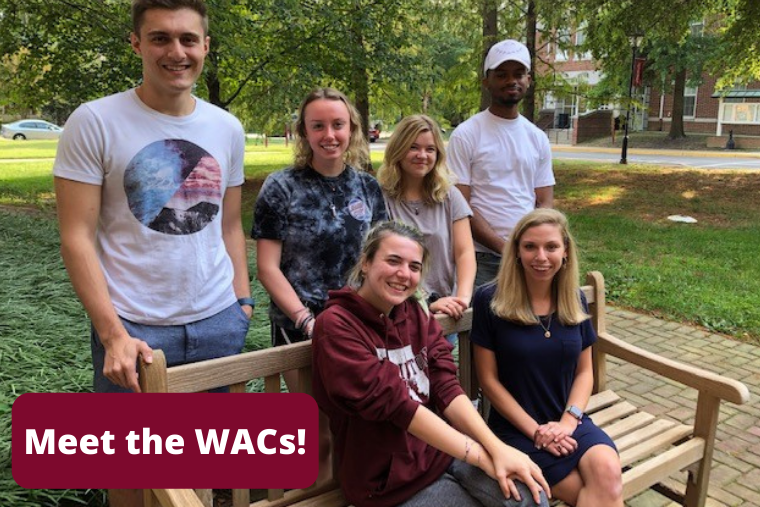New Wellness Advocacy Program Launches
New Wellness Program Taps Into an Additional Layer of Mental Health Support for Students

Counseling Services and the Psychology Department have teamed up to launch a new student support program called WAC-squared, or Washington College Wellness Advocacy Coaching. Under this innovative program, students are trained as coaches and available to listen to and support their peers at a higher level. The key difference between existing supports from the Peer Mentors and RAs and this additional layer of frontline support is that the Wellness Advocacy Coaches – WACs -- are trained in mental health first aid.
Beginning the week of September 13, students will be able to drop-in to talk with a WAC on Monday, Wednesday or Thursday evenings from 6:30 to 8:30 p.m. The coaches have an office on the first floor of Hodson, where the Student Events Board is located. Students can also call the office, but the phone line is only staffed during these same in-person hours and is not set up for voicemails. The phone number is 410-778-6118.
“This type of peer support is trending at college and universities nationwide, because we know that students are often more comfortable sharing their feelings with their peers, who they naturally feel will understand and can better relate to their experience,” said Miranda Altman, Director of the Counseling Center.
Seven students were invited to become a WAC based on recommendations from faculty, and/or because they were actively involved in mental health initiatives on campus already. They have completed a mandatory mental health first aid training course, and will take part in weekly review meetings with Altman. And because the coaching program has been designed as a for-credit internship, the experience also includes weekly class time with Lauren Littlefield, Professor of Psychology and Coordinator of the department's clinical/counseling concentration.
“The WACs are caring students who strive to promote general well-being, destigmatize help-seeking behavior, and provide a place to have a conversation about those things that are happening in your life,” said Altman.
As trained coaches, they are prepared to address and support students experiencing things like sadness, stress, anxiety, sleep-deprivation. They are there to offer support, direction, and guidance. They also know how to spot signs of more serious distress, in which case they will alert one of the staff clinicians and help guide the student to the right resource.
“I am fortunate to be partnering with Miranda Altman and this group of talented students,” says Littlefield. “It is a win-win situation. The WACs get meaningful helping experience, and the student body has an additional layer of support available. Plus, as part of the credit-bearing internship course, the WACs will brainstorm and collaborate on forms of wellness outreach that will touch a broader group of students, such as inviting guest speakers, creating informational videos, and managing the washcoll_counseling Instagram account.”
Senior Austen Markus is one of the trained WACs, and sees great benefit in providing students with an opportunity to access mental health resources in a non-judgmental space, facilitated by a peer rather than a professional. “It's easy to tell people that therapy is important or that self-care matters, but rarely do we get an opportunity to discuss with someone how difficult those things are - and it's even rarer that the people to whom we're confiding have the resources to help us overcome those difficulties,” said Markus. “Wellness Advocacy Coaches are able to listen to you as a peer and an equal, but they're also able to help you take the first steps towards getting help if you find yourself stuck.”
One of the goals of this program and their work will be to increase awareness of the resources available and help to destigmatize asking for help. “A large part of why I chose to participate in this program was to ensure students coming into WAC are given the opportunity to learn about the resources I wish I had known about when I was first arriving on campus,” they said. “I also wanted to be a student resource on campus with experience navigating the specific intricacies of being an LGBTQ+ student on campus.”
The WACs are available to the entire student body, and Markus feels strongly that everyone can benefit from this offering. All WACs have signed a confidentiality agreement and understand that these support sessions are covered under privacy laws. “Peer support provides a space where you get to be the center of the conversation,” said Markus, “where your issues are most important, and where we will always protect your privacy and your safety first and foremost.”
“We're here to listen and refer on any number of problems, serious or simple,” they added. “Whether you just need to complain about a class that's stressing you out, or you're dealing with a mental health situation that's becoming too much to handle, we're here to help. We're college students, too - we know how hard things can get and how worn-out stress can make you feel. It's something students shouldn't have to feel like they have to go through alone, and that's why WACs exist.”
In addition to Austen Markus, the other coaches who are ready to provide support through this program are: Lauryn Konieczka, Madison Krivda, Kayleigh Maimone, Anna Miller, Alex Papadopoulos and James Williams.